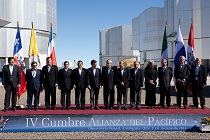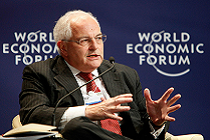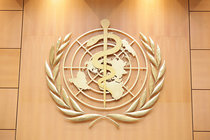Eastern Europe Goes South
Many eastern European states who are part of the EU and were admitted only after being deemed compliant with the Copenhagen criteria have seen political parties in these countries become increasingly illiberal
 Courtesy: Foreign Affairs
Courtesy: Foreign Affairs
Many eastern European states who are part of the EU and were admitted only after being deemed compliant with the Copenhagen criteria have seen political parties in these countries become increasingly illiberal
 Courtesy: Foreign Affairs
Courtesy: Foreign Affairs
When the average growth rate in emerging markets hit over seven percent a year in the last decade, forecasters hyped its implications. Today, more than five years after the financial crisis of 2008, the euphoria seems to have waned
 Courtesy: European Southern Observatory
Courtesy: European Southern Observatory
Recent developments indicate that Pacific Alliance member states have their gaze firmly set upon Asian-Pacific and ASEAN economies. Can a Pacific Alliance deal with China or ASEAN serve as a powerful incentive to force the ratification of the Trans-Pacific Partnership (TPP) through the U.S. Senate?
 Courtesy:
Courtesy:
D. P. Satish in his review of Rahul Pandita’s latest book writes that it is a bold attempt at voicing despair about a nation that mouths lofty platitudes but does little to protect its persecuted communities.
 Courtesy: Foreign Affairs
Courtesy: Foreign Affairs
There’s been much talk about the “the rise of the rest,” with Brazil, Russia, India, and China leading the charge. However, few countries can sustain unusually fast growth for a decade, and even fewer, for more than that. As the boom years begin to end, the international order won’t change as much as expected.
 Courtesy: World Economic Forum/Flickr
Courtesy: World Economic Forum/Flickr
The emerging BRICS economies agree that the West should hold less sway in the global economy. But their leaders, despite regular summits, have failed to articulate a coherent vision because of divergent interests, says journalist Martin Wolf.
 Courtesy: Newsdesk
Courtesy: Newsdesk
Alongside the 2012 BRICS Summit in Delhi, this special publication is a collection of articles that addresses important issues of the global agenda, the priorities of BRICS, the policies and competitive advantages of the participants, as well as BRICS institutionalization.
 Courtesy: Pragati
Courtesy: Pragati
IBSA’s abstention over Syria is an argument against Security Council reform. Critics of reform have long argued that increasing the number of permanent members to include Brazil and India would lead to paralysis.
 Courtesy: US Mission Geneva
Courtesy: US Mission Geneva
Over the last three decades, public funding for global health organizations has dried up. Private companies are writing checks to fill the gap and are bending the agenda toward their interests. Realigning priorities will mean getting more private firms involved - not less.
 Courtesy: Foreign Affairs
Courtesy: Foreign Affairs
As Indonesia hosts a number of high-level summits this year, it looks set to take its place among the world’s economic superstars. But celebrations are premature: although Indonesia has made great strides, its gains are reversible. To continue to prosper, Jakarta must address rampant corruption and poor governance